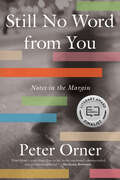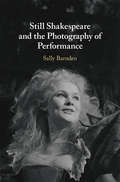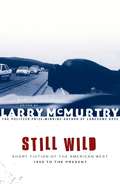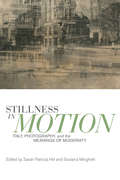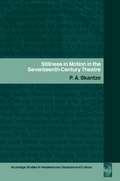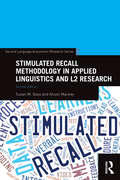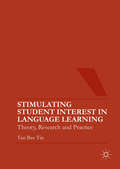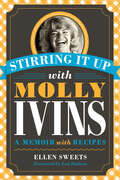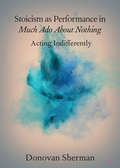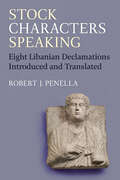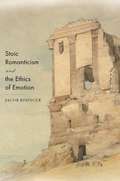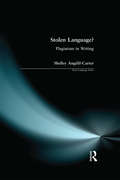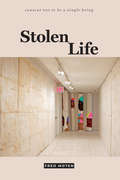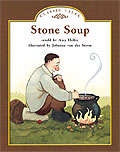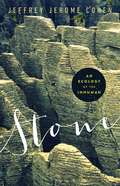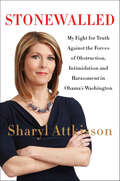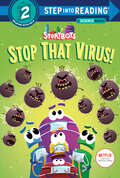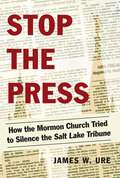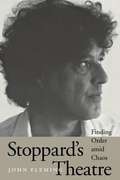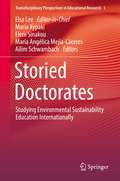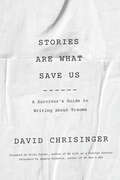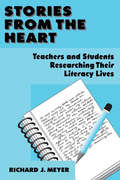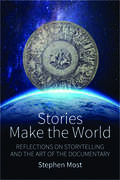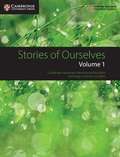- Table View
- List View
Still No Word from You: Notes in the Margin
by Peter OrnerFinalist for the Vermont Book AwardFinalist for the PEN/Diamonstein-Spielvogel Award for the Art of the EssayA new collection of pieces on literature and life by the author of Am I Alone Here?, a finalist for the NBCC Award for CriticismStationed in the South Pacific during World War II, Seymour Orner wrote a letter every day to his wife, Lorraine. She seldom responded, leading him to plead in 1945, &“Another day and still no word from you.&” Seventy years later, Peter Orner writes in response to his grandfather&’s plea: &“Maybe we read because we seek that word from someone, from anyone.&”From the acclaimed fiction writer about whom Dwight Garner of The New York Times wrote, &“You know from the second you pick him up that he&’s the real deal,&” comes Still No Word from You, a unique chain of essays and intimate stories that meld the lived life and the reading life. For Orner, there is no separation. Covering such well-known writers as Lorraine Hansberry, Primo Levi, and Marilynne Robinson, as well as other greats like Maeve Brennan and James Alan McPherson, Orner&’s highly personal take on literature alternates with his own true stories of loss and love, hope and despair. In his mother&’s copy of A Coney Island of the Mind, he&’s stopped short by a single word in the margin, &“YES!&”—which leads him to conjure his mother at twenty-three. He stops reading Penelope Fitzgerald&’s The Beginning of Spring three quarters of the way through because he knows that finishing the novel will leave him bereft. Orner&’s solution is to start again from the beginning to slow the inevitable heartache.Still No Word from You is a book for anyone for whom reading is as essential as breathing.
Still Shakespeare and the Photography of Performance
by Sally BarndenStill Shakespeare and the Photography of Performance examines the place of photography in the reception of the Shakespeare canon since the invention of the camera, looking at how photographic images have shaped perceptions of historicity, performance, and Shakespearean character, and how their dissemination has affected Shakespearean authority. Barnden reveals how photography has conditioned the reception of Shakespeare's works in two key ways. Firstly, as a form of performance documentation, photographs shape the way individual performances are remembered and their positioning in relation to traditional and iconoclastic interpretations of the text. Secondly, photographs are vehicles of Shakespearean iconography, encouraging certain compositions and interpretations. Exploring both theatrical and staged art photographs, Still Shakespeare demonstrates the role of photography as a contributor to the calcification of Shakespearean quotation, advertising, and iconography, and to the attrition of the relationship between image and text whereby images become attached to narratives far beyond their original context.
Still Wild: Short Fiction of the American West 1950 to the Pre
by Larry McMurtryLarry McMurtry, the preeminent chronicler of the American West, celebrates the best of contemporary Western short fiction, introducing a stellar collection of twenty stories that represent, in various ways, the coming-of-age of the legendary American frontier.Featuring a veritable Who's Who of the century's most distinctive writers, this collection effectively departs from the standard superstars of the Western genre. McMurtry has chosen a refreshing range of work that, when taken as a whole, depicts the evolution and maturation of Western writing over several decades. The featured tales are not so concerned with the American West of history and geography as they are with the American West of the imagination—one that is alternately comic, gritty, individual, searing, and complex. Including authors such as Jack Kerouac, Wallace Stegner, Raymond Carver, Annie Proulx, and Diana Ossana, this collection captures the real Western canon like no other.
Stillness in Motion
by Giuliana Minghelli Sarah Sally HillStillness in Motion brings together the writing of scholars, theorists, and artists on the uneasy relationship between Italian culture and photography. Highlighting the depth and complexity of the Italian contribution to the technology and practice of photography, this collection offers essays, interviews, and theoretical reflections at the intersection of comparative, visual, and cultural studies. Its extensively illustrated chapters explore how Italian literature, cinema, popular culture, and politics have engaged with the medium of photography over the course of time.The collection includes topics such as Futurism's ambivalent relationship to photography, the influence of American photography on Italian neorealist cinema, and the connection between the photograph and Duchamp's concept of the Readymade. With contributions from writer and theorist Umberto Eco, photographer Franco Vaccari, art historian Robert Valtorta, and cultural historian Robert Lumley, Stillness in Motion engages with crucial historical and cultural moments in Italian history, examining each one through particular photographic practices.
Stillness in Motion in the Seventeenth Century Theatre (Routledge Studies in Renaissance Literature and Culture #Vol. 1)
by P.A. SkantzeStillness in Motion in the Seventeenth Century Theatre provides a comprehensive examination of this aesthetic theory. The author investigates this aesthetic history as a form of artistic creation, philosophical investigation, a way of representing and manipulating ideas about gender and a way of acknowledging, reinforcing and making a critique of social values for the still and moving, the permanent and elapsing. The book's analysis covers the entire seventeenth-century with chapters on the work of Ben Jonson, John Milton, the pamphletheatre, Aphra Behn, John Vanbrugh and Jeremy Collier and will be of interest to scholars in the areas of literary and performance studies.
Stimulated Recall Methodology in Applied Linguistics and L2 Research (Second Language Acquisition Research Series)
by Alison Mackey Susan M. GassStimulated Recall Methodology in Applied Linguistics and L2 Research provides researchers and students in second language acquisition and applied linguistics with the only how-to guide on using stimulated recalls in their research practice. This new edition expands on the scope of the previous edition, walking readers step-by-step through a range of studies in applied linguistics in order to demonstrate the history of stimulated recalls and their efficacy as a data collection tool. With its exclusive focus on stimulated recalls, coverage of the most up-to-date research studies, and pedagogically rich text design, Stimulated Recall Methodology in Applied Linguistics and L2 Research supplies researchers and students with the practical skills to elicit richer data in their own research.
Stimulating Student Interest in Language Learning
by Tan Bee TinThis book explores the issues and concerns many language teachers have in not just helping able students to learn a foreign or second language but more importantly how to get reluctant learners to become interested in language learning. Tin proposes 'interest' as an important construct that requires investigation if we are to understand second language learning experiences in a modern globalised world. The book offers both theoretical explorations and empirical findings arising from the author's own research in the field. Chapters demonstrate how various theoretical and empirical findings can be applied to practice so as to raise the awareness of the importance of interest in language learning and teaching. For teacher trainers and educators, researchers, and practising language teachers, this comprehensive study provides tools to stimulate student interest in language learning for successful language learning.
Stirring It Up with Molly Ivins: A Memoir with Recipes
by Ellen SweetsYou probably knew Molly Ivins as an unabashed civil libertarian who used her rapier wit and good ole Texas horse sense to excoriate political figures she deemed unworthy of our trust and respect. But did you also know that Molly was one helluva cook? And we’re not just talking chili and chicken-fried steak, either. Molly Ivins honed her culinary skills on visits to France—often returning with perfected techniques for saumon en papillote or delectable clafouti aux cerises. Friends who had the privilege of sharing Molly’s table got not only a heaping helping of her insights into the political shenanigans of the day, but also a mouth-watering meal, prepared from scratch with the finest ingredients and assembled with the same meticulous attention to detail that Molly devoted to skewering a political recalcitrant. In Stirring It Up with Molly Ivins, her longtime friend, fellow reporter, and frequent sous-chef Ellen Sweets takes us into the kitchen with Molly and introduces us to the private woman behind the public figure. She serves up her own and others’ favorite stories about Ivins as she recalls the fabulous meals they shared, complete with recipes for thirty-five of Molly’s signature dishes. These stories reveal a woman who was even more fascinating and complex than the “professional Texan” she enjoyed playing in public. Friends who ate with Molly knew a cultured woman who was a fluent French speaker, voracious reader, rugged outdoors aficionado, music lover, loyal and loving friend, and surrogate mom to many of her friends’ children, as well as to her super-spoiled poodle. They also came to revere the courageous woman who refused to let cancer stop her from doing what she wanted, when she wanted. This is the Molly you’ll be delighted to meet in Stirring It Up with Molly Ivins.
Stocism as Performance in Much Ado about Nothing: Acting Indifferently (Elements in Shakespeare Performance)
by Donovan ShermanThis Element demonstrates how Shakespeare's Much Ado about Nothing models an understanding of the philosophy of Stoicism as performance, rather than as intellectual doctrine. To do this, it explores how, despite many early modern cultural institutions' suppression of Stoicism's theatrical capacity, a performative understanding lived on in one of the most influential texts of the era, Baldassare Castiglione's The Book of the Courtier, and that this performativity was itself inherited from one of Castiglione's sources, Cicero's De Oratore. The books concludes with a sustained reading of Much Ado to demonstrate how the play, in performance, itself acts as a Stoic exercise.
Stock Characters Speaking: Eight Libanian Declamations Introduced and Translated
by Robert PenellaDeclamations were composed and orally delivered in the Roman Empire by sophists, or teachers of rhetoric, of whom the Greek-speaking Libanius was one of the most distinguished. Stock Characters Speaking may be thought of as emerging from three developments of recent decades: an explosive interest in late antiquity, a newly sympathetic interest in rhetoric (including ancient declamation), and a desire to bring Libanius’s massive corpus into English and other modern languages. In this book, author Robert J. Penella translates eight of Libanius’s declamations: 29, 30, 34, 35, 37, 45, 46, 47, and, in an appendix, the thirteenth-century Gregory of Cyprus’s response to Declamation 34. Each translation is accompanied by an introduction, in which Penella examines the themes, structure, and the stasis, or key issue, of the declamations. Figures who appear in the translated declamations include a parasite who has lost his patron, a man envious of his rich neighbor, a miser’s son, a poor man willing to die for his city, a rich war-hero accused of aiming at tyranny, and a convict asking for exile. Three of these declamations have appeared in German; otherwise, these translations are the first into a modern language.
Stoic Romanticism and the Ethics of Emotion
by Jacob RisingerAn exploration of Stoicism’s central role in British and American writing of the Romantic periodStoic philosophers and Romantic writers might seem to have nothing in common: the ancient Stoics championed the elimination of emotion, and Romantic writers made a bold new case for expression, adopting “powerful feeling” as the bedrock of poetry. Stoic Romanticism and the Ethics of Emotion refutes this notion by demonstrating that Romantic-era writers devoted a surprising amount of attention to Stoicism and its dispassionate mandate. Jacob Risinger explores the subterranean but vital life of Stoic philosophy in British and American Romanticism, from William Wordsworth to Ralph Waldo Emerson. He shows that the Romantic era—the period most polemically invested in emotion as art’s mainspring—was also captivated by the Stoic idea that aesthetic and ethical judgment demanded the transcendence of emotion.Risinger argues that Stoicism was a central preoccupation in a world destabilized by the French Revolution. Creating a space for the skeptical evaluation of feeling and affect, Stoicism became the subject of poetic reflection, ethical inquiry, and political debate. Risinger examines Wordsworth’s affinity with William Godwin’s evolving philosophy, Samuel Taylor Coleridge’s attempt to embed Stoic reflection within the lyric itself, Lord Byron’s depiction of Stoicism at the level of character, visions of a Stoic future in novels by Mary Shelley and Sarah Scott, and the Stoic foundations of Emerson’s arguments for self-reliance and social reform.Stoic Romanticism and the Ethics of Emotion illustrates how the austerity of ancient philosophy was not inimical to Romantic creativity, but vital to its realization.
Stolen Language?: Plagiarism in Writing (Real Language Series)
by Shelley Angelil-CarterReal Language SeriesGeneral Editors-Jennifer Coates, Jenny Cheshire and Euan ReidThis is a sociolinguistic series about the relationships between language, society and social change. Books in the series draw on natural language data from a wide range of social contexts. The series takes a critical approach to the subject, challenging current orthodoxies, and dealing with familiar topics in new ways. The topic of plagiarism is a highly contentious issue and one that is of growing interest and importance in higher education across the world. Stolen Language? Plagiarism in Writing uncovers the reasons why students plagiarize, and explains what can be done about it. It challenges the concepts of original authorship of language, tracing the notion of plagiarism to the introduction of copyright laws in the eighteenth century. The analysis presented in this book explores plagiarism as complex and contested, and suggests that in student academic writing it may be the surface manifestation of learning difficulties related to the educational environment, the nature of academic discourse and the nature of language.Underlying the concept of plagiarism is the premise that meaning is made by the individual, using the system of language at his or her disposal. The words and ideas then belong to the individual who first thought of them, or who first used these words in a particular way. New understandings, that language and cognition are fundamentally social and cultural, contest the idea of 'original thought' or 'original language'. In addition, what constitutes plagiarism differs depending on the genre and context of writing.Stolen Language shows that there is in any good writing an authorial presence, an authorial voice which is particularly difficult for the novice writer to control when constructing an essay based on multiple texts. Written in a unique and accessible way, the book also looks at the particular difficulties experienced by writers of English as an additional language and provides a practical framework for academics and teachers of writing on how to develop authorial voice and critical thinking in the student writer.
Stolen Life (consent not to be a single being #[v. 2])
by Fred Moten"Taken as a trilogy, consent not to be a single being is a monumental accomplishment: a brilliant theoretical intervention that might be best described as a powerful case for blackness as a category of analysis."—Brent Hayes Edwards, author of Epistrophies: Jazz and the Literary Imagination In Stolen Life—the second volume in his landmark trilogy consent not to be a single being—Fred Moten undertakes an expansive exploration of blackness as it relates to black life and the collective refusal of social death. The essays resist categorization, moving from Moten's opening meditation on Kant, Olaudah Equiano, and the conditions of black thought through discussions of academic freedom, writing and pedagogy, non-neurotypicality, and uncritical notions of freedom. Moten also models black study as a form of social life through an engagement with Fanon, Hartman, and Spillers and plumbs the distinction between blackness and black people in readings of Du Bois and Nahum Chandler. The force and creativity of Moten's criticism resonate throughout, reminding us not only of his importance as a thinker, but of the continued necessity of interrogating blackness as a form of sociality.
Stone Soup (Fountas & Pinnell LLI Green #Level I, Lesson 95)
by Amy HelferFountas and Pinnell Leveled Literacy Intervention Green System -- 1st Grade
Stone: An Ecology of the Inhuman
by Jeffrey Jerome CohenStone maps the force, vivacity, and stories within our most mundane matter, stone. For too long stone has served as an unexamined metaphor for the &“really real&”: blunt factuality, nature&’s curt rebuke. Yet, medieval writers knew that stones drop with fire from the sky, emerge through the subterranean lovemaking of the elements, tumble along riverbeds from Eden, partner with the masons who build worlds with them. Such motion suggests an ecological enmeshment and an almost creaturely mineral life. Although geological time can leave us reeling, Jeffrey Jerome Cohen argues that stone&’s endurance is also an invitation to apprehend the world in other than human terms. Never truly inert, stone poses a profound challenge to modernity&’s disenchantments. Its agency undermines the human desire to be separate from the environment, a bifurcation that renders nature &“out there,&” a mere resource for recreation, consumption, and exploitation. Written with great verve and elegance, this pioneering work is notable not only for interweaving the medieval and the modern but also as a major contribution to ecotheory. Comprising chapters organized by concept —&“Geophilia,&” &“Time,&” &“Force,&” and &“Soul&”—Cohen seamlessly brings together a wide range of topics including stone&’s potential to transport humans into nonanthropocentric scales of place and time, the &“petrification&” of certain cultures, the messages fossils bear, the architecture of Bordeaux and Montparnasse, Yucca Mountain and nuclear waste disposal, the ability of stone to communicate across millennia in structures like Stonehenge, and debates over whether stones reproduce and have souls. Showing that what is often assumed to be the most lifeless of substances is, in its own time, restless and forever in motion, Stone fittingly concludes by taking us to Iceland⎯a land that, writes the author, &“reminds us that stone like water is alive, that stone like water is transient.&”
Stones of Law, Bricks of Shame
by Jan Alber Frank LauterbachThe prison system was one of the primary social issues of the Victorian era and a regular focus of debate among the period?s reformers, novelists, and poets. Stones of Law, Bricks of Shame brings together essays from a broad range of scholars, who examine writings on the Victorian prison system that were authored not by inmates, but by thinkers from the respectable middle class. Studying the ways in which writings on prisons were woven into the fabric of the period, the contributors consider the ways in which these works affected inmates, the prison system, and the Victorian public. Contesting and extending Michel Foucault's ideas on power and surveillance in the Victorian prison system, Stones of Law, Bricks of Shame covers texts from Charles Dickens to Henry James. This essential volume will refocus future scholarship on prison writing and the Victorian era.
Stonewalled: My Fight for Truth Against the Forces of Obstruction, Intimidation, and Harassment in Obama's Washington
by Sharyl AttkissonSeasoned CBS reporter Sharyl Attkisson reveals how she has been electronically surveilled while digging deep into the Obama Administration and its scandals, and offers an incisive critique of her industry and the shrinking role of investigative journalism in today’s media.Americans are at the mercy of powerful figures in business and government who are virtually unaccountable. The Obama Administration in particular has broken new ground in its monitoring of journalists, intimidation and harassment of opposition groups, and surveillance of private citizens.Sharyl Attkisson has been a journalist for more than thirty years. During that time she has exposed scandals and covered controversies under both Republican and Democratic administrations. She has also seen the opponents of transparency go to ever greater lengths to discourage and obstruct legitimate reporting.Attkisson herself has been subjected to “opposition research” efforts and spin campaigns. These tactics increased their intensity as she relentlessly pursued stories that the Obama Administration dismissed. Stonewalled is the story of how her news reports were met with a barrage of PR warfare tactics, including online criticism, as well as emails and phone calls up the network chain of command in an effort to intimidate and discourage the next story. In Stonewalled, Attkisson recounts her personal tale, setting it against the larger story of the decline of investigative journalism and unbiased truth telling in America today.
Stop That Virus! (Step into Reading)
by Scott EmmonsThe curious crew from Netflix's Ask the StoryBots star in an all-new Step into Reading leveled readerWhat is a virus? How do you catch a cold? Beep, Boop, and the rest of the robots from Netflix's Ask the StoryBots are looking for answers. The inquisitive team make this timely concern interesting, entertaining, and not-so-scary. Boys and girls ages 4 to 6 who love the StoryBots will enjoy this fun and educational Step 2 Step into Reading leveled reader.Step 2 Readers use basic vocabulary and short sentences to tell simple stories. For children who recognize familiar words and can sound out new words with help.
Stop the Press: How the Mormon Church Tried to Silence the Salt Lake Tribune
by James W. UreThis disturbing expose examines how the powerful Mormon Church tried to destroy the Salt Lake Tribune, a voice that had long been critical of many of its activities and its secrets. The author, a Mormon and a journalist who once worked for the Tribune, tells a story of secret deals, behind-the-scenes backstabbing, and manipulation of the political and legal systems by a church that controls the politics of Utah. Based on many interviews and extensive research, the book describes the history of enmity between the Church and the newspaper, which came to a head in 2000. In that year, the Tribune reopened an investigation into an 1857 murder of a wagon train of 120 men, women, and children passing through Utah. The Mountain Meadow Massacre had been conducted by highly-placed church members and historians have said it was condoned by Brigham Young, the leader of the Mormon Church. The published stories intensified efforts by the Church to kill the newspaper. When a hedge fund took ownership of the Tribune, the Church in 2013 saw an opportunity to take advantage and ensure the paper's demise. Just as the paper appeared to be going under, a small group of citizens became the David that took down the Mormon Goliath and delivered the Pulitzer Prize-winning paper to a steady local owner who is willing to fight for its long-term survival. This is a cautionary tale about the dangers of mingling church and state and the ways in which big money can threaten the freedom of the press.
Stoppard's Theatre: Finding Order amid Chaos
by John FlemingWith a thirty-year run of award-winning, critically acclaimed, and commercially successful plays, from Rosencrantz and Guildenstern Are Dead (1967) to The Invention of Love (1997), Tom Stoppard is arguably the preeminent playwright in Britain today. His popularity also extends to the United States, where his plays have won three Tony awards and his screenplay for Shakespeare in Love won the 1998 Academy Award for Best Original Screenplay.<P><P>John Fleming offers the first book-length assessment of Stoppard's work in nearly a decade. He takes an in-depth look at the three newest plays (Arcadia, Indian Ink, and The Invention of Love) and the recently revised versions of Travesties and Hapgood, as well as at four other major plays (Rosencrantz, Jumpers, Night and Day, and The Real Thing). Drawing on Stoppard's personal papers at the University of Texas Harry Ransom Humanities Research Center (HRHRC), Fleming also examines Stoppard's previously unknown play Galileo, as well as numerous unpublished scripts and variant texts of his published plays.
Storied Doctorates: Studying Environmental Sustainability Education Internationally (Transdisciplinary Perspectives in Educational Research #1)
by Elsa LeeThis book brings together the diverse narratives of researchers’ personalized stories about the process of doing doctoral research (PhD) in the field of Environmental and Sustainability Education (ESE) and about the life after the completion of such life-forming experience. The narratives go beyond the academic to discuss the different ways in which doctoral study in the field of environmental and sustainability education is experienced at the personal and professional level. Contributors are located in different countries in Europe, Australasia and Latin America. The different countries that the authors write from matters because it contextualizes both the process of studying environmental and sustainability education and the way in which this is experienced at a time when the world has become increasingly conscientized towards environmental challenges. As such the book is appreciated by established and emerging scholars in this field and in related fields around the world. Readers are presented with a comprehensive volume ideal for aspiring ESE researchers, supervisors, policy-makers and practitioners.
Stories Are What Save Us: A Survivor's Guide to Writing about Trauma
by David ChrisingerA seasoned writer and teacher of memoir explores both the difficulties inherent in writing about personal trauma and the techniques for doing so in a compelling way.Since 2013, David Chrisinger has taught military veterans, their families, and other trauma survivors how to make sense of and recount their stories of loss and transformation. The lessons he imparts can be used by anyone who has ever experienced trauma, particularly people with a deep need to share that experience in a way that leads to connection and understanding. In Stories Are What Save Us, Chrisinger shows—through writing exercises, memoir excerpts, and lessons he's learned from his students—the most efficient ways to uncover and effectively communicate what you've learned while fighting your life's battles, whatever they may be. Chrisinger explores both the difficulties inherent in writing about personal trauma and the techniques for doing so in a compelling way. Weaving together his journey as a writer, editor, and teacher, he reveals his own deeply personal story of family trauma and abuse and explains how his life has informed his writing. Part craft guide, part memoir, and part teacher's handbook, Stories Are What Save Us presents readers with a wide range of craft tools and storytelling structures that Chrisinger and his students have used to process conflict in their own lives, creating beautiful stories of growth and transformation. Throughout, this profoundly moving, laser-focused book exemplifies the very lessons it strives to teach. A foreword by former soldier and memoirist Brian Turner, author of My Life as a Foreign Country, and an afterword by military wife and memoirist Angela Ricketts, author of No Man's War: Irreverent Confessions of an Infantry Wife, bookend the volume.
Stories From the Heart: Teachers and Students Researching their Literacy Lives
by Richard J. MeyerStories from the Heart is for, by, and about prospective and practicing teachers understanding themselves as curious and literate beings, making connections with colleagues, and researching their own literacy and the literacy lives of their students. It demonstrates the power and importance of story in our own lives as literate individuals. Readers are encouraged to: tell, write, or re-create the stories of their literacy lives in order to understand how they learn and teach; begin the journey into writing the stories of others' literacy lives; find support in their researching endeavors; and examine the idea of framing stories by using the work of other teachers and researchers.
Stories Make the World: Reflections on Storytelling and the Art of the Documentary
by Stephen MostSince the beginning of human history, stories have helped people make sense of their lives and their world. Today, an understanding of storytelling is invaluable as we seek to orient ourselves within a flood of raw information and an unprecedented variety of supposedly true accounts. In Stories Make the World, award-winning screenwriter Stephen Most offers a captivating, refreshingly heartfelt exploration of how documentary filmmakers and other storytellers come to understand their subjects and cast light on the world through their art. Drawing on the author's decades of experience behind the scenes of television and film documentaries, this is an indispensable account of the principles and paradoxes that attend the quest to represent reality truthfully.
Stories Of Ourselves: Cambridge Assessment International Education Anthology Of Stories In English (Cambridge International Examinations Ser.)
by University of Cambridge ESOL ExaminationsThis series contains poetry and prose anthologies composed of writers from across the English-speaking world. Parts of Stories of Ourselves Volume 1 are set for study in Cambridge IGCSE®, O Level and International AS & A Level Literature in English courses. Each short story in this collection has its own unique voice and point of view. They may differ in form, genre, style, tone and origin, but all have been chosen because of their wide appeal. Written in English by authors from different countries and cultures, the anthology includes works by Charles Dickens, H.G. Wells, Virginia Woolf, Graham Greene, V.S. Naipaul, R.K Narayan, Janet Frame, Raymond Carver, Jhumpa Lahiri, Annie Proulx and many others.
